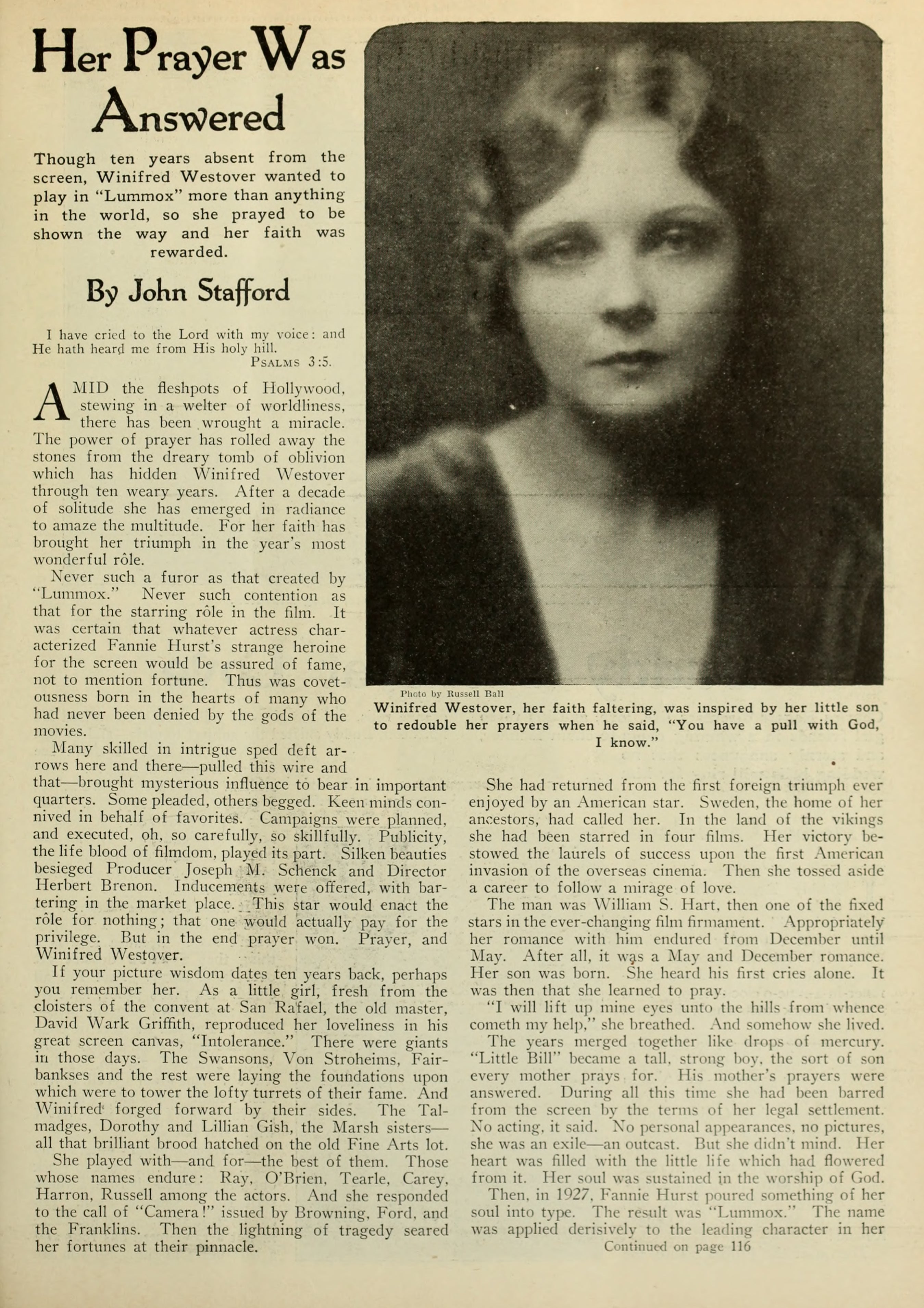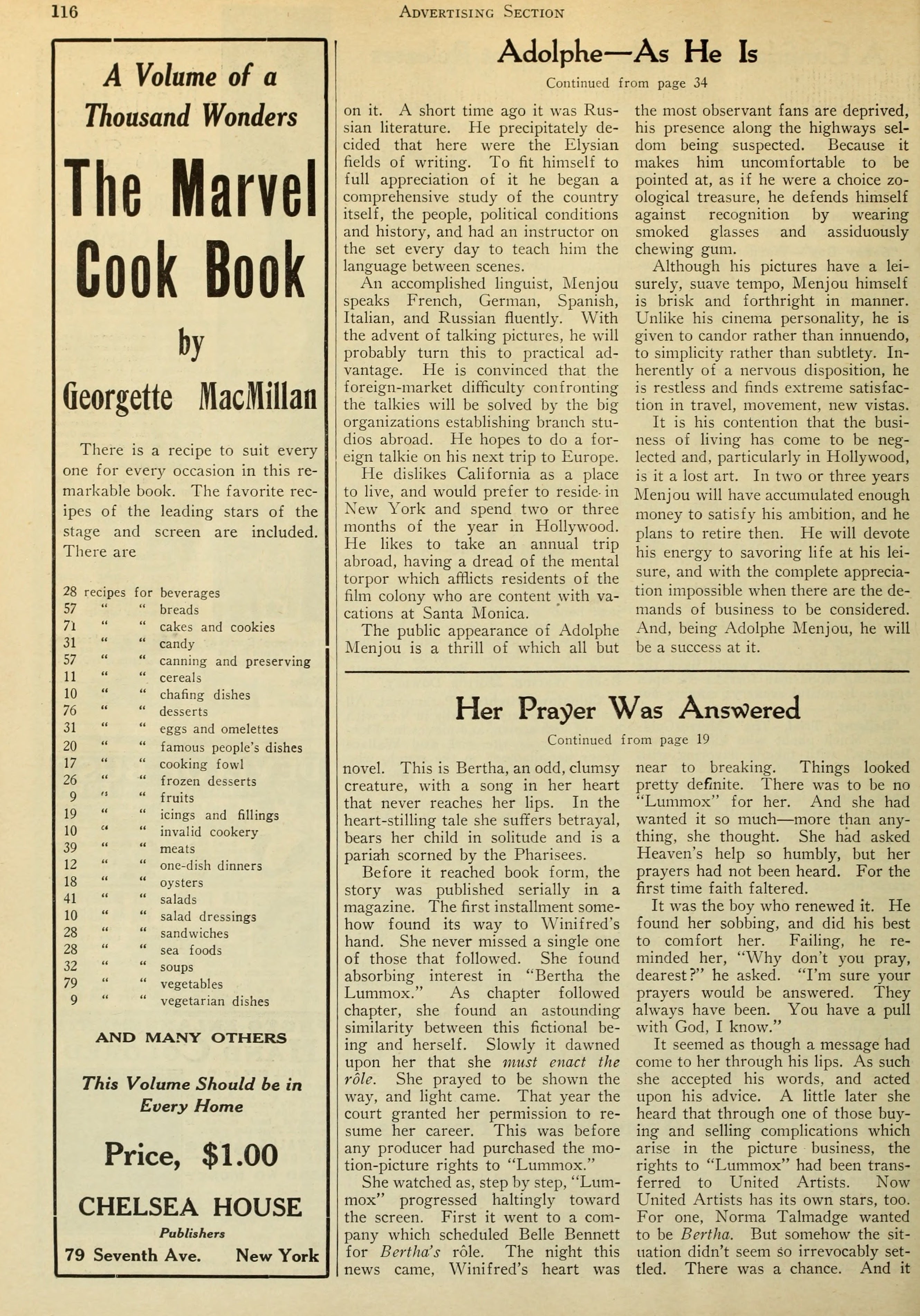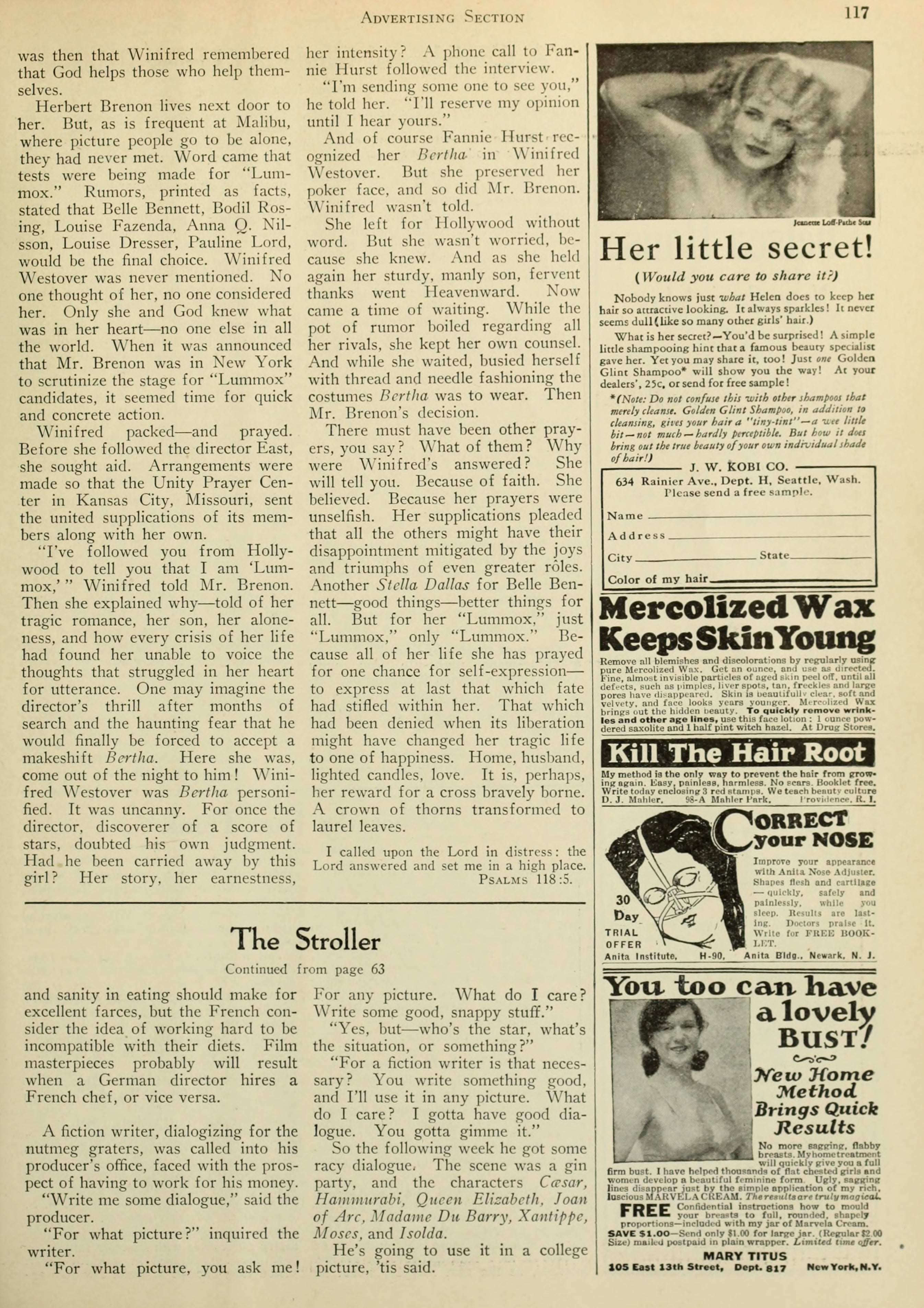Winifred Westover — Her Prayer Was Answered (1929) 🇺🇸

I have cried to the Lord with my voice: and He hath heard me from His holy hill. — Psalms 3:5.
by John Stafford
Amid the fleshpots of Hollywood, stewing in a welter of worldliness. there has been wrought a miracle. The power of prayer has rolled away the stones from the dreary tomb of oblivion which has hidden Winifred Westover through ten weary years. After a decade of solitude she has emerged in radiance to amaze the multitude. For her faith has brought her triumph in the year’s most wonderful role.
Never such a furor as that created by Lummox. Never such contention as that for the starring role in the film. It was certain that whatever actress characterized Fannie Hurst’s strange heroine for the screen would be assured of fame, not to mention fortune. Thus was covetousness born in the hearts of many who had never been denied by the gods of the movies.
Many skilled in intrigue sped deft arrows here and there — pulled this wire and that — brought mysterious influence to bear in important quarters. Some pleaded, others begged. Keen minds connived in behalf of favorites. Campaigns were planned, and executed, oh, so carefully, so skillfully. Publicity, the life blood of filmdom, played its part. Silken beauties besieged Producer Joseph M. Schenck and Director Herbert Brenon. Inducements were offered, with bartering in the market place. This star would enact the role for nothing; that one would actually pay for the privilege. But in the end prayer won. Prayer, and Winifred Westover.
If your picture wisdom dates ten years back, perhaps you remember her. As a little girl, fresh from the cloisters of the convent at San Rafael, the old master, David Wark Griffith, reproduced her loveliness in his great screen canvas, Intolerance. There were giants in those days. The Swansons, Von Stroheims, Fairbankses and the rest were laying the foundations upon which were to tower the lofty turrets of their fame. And Winifred forged forward by their sides. The Talmadges, Dorothy and Lillian Gish, the Marsh sisters — all that brilliant brood hatched on the old Fine Arts lot [D. W. Griffith, Gloria Swanson, Erich von Stroheim, Douglas Fairbanks Sr., Constance Talmadge, Norma Talmadge Natalie Talmadge, Dorothy Gish, Mae Marsh, Marguerite Marsh].
She played with — and for — the best of them. Those whose names endure: Ray, O’Brien, Tearle, Carey, Harron, Russell [Charles Ray, George O’Brien, Conway Tearle, Harry Carey, Robert Harron, Harold Russell] among the actors. And she responded to the call of “Camera!” issued by Browning, Ford, and the Franklins [Tod Browning, John Ford, Chester Franklin, Sidney Franklin]. Then the lightning of tragedy seared her fortunes at their pinnacle.
She had returned from the first foreign triumph ever enjoyed by an American star. Sweden, the home of her ancestors, had called her. In the land of the vikings she had been starred in four films. Her victory bestowed the laurels of success upon the first American invasion of the overseas cinema. Then she tossed aside a career to follow a mirage of love.
The man was William S. Hart, then one of the fixed stars in the ever-changing film firmament. Appropriately her romance with him endured from December until May. After all, it was a May and December romance. Her son was born. She heard his first cries alone. It was then that she learned to pray.
“I will lift up mine eyes unto the hills from whence cometh my help,” she breathed. And somehow she lived.
The years merged together like drops of mercury. “Little Bill” became a tall, strong boy. the sort of sun every mother prays for. His mother’s prayers were answered. During all this time she had been barred from the screen by the terms of her legal settlement. No acting, it said. No personal appearances, no pictures, she was an exile — an outcast. But he didn’t mind. Her heart was filled with the little life which had flowered from it. Her soul was sustained in the worship of God.
Then, in 1927, Fannie Hurst poured something of her soul into type. The result was Lummox. The name was applied derisively to the leading character in her novel. This is Bertha, an odd, clumsy creature, with a song in her heart that never reaches her lips. In the heart-stilling tale she suffers betrayal, bears her child in solitude and is a pariah scorned by the Pharisees.
Before it reached book form, the story was published serially in a magazine. The first installment somehow found its way to Winifred’s hand. She never missed a single one of those that followed. She found absorbing interest in Bertha the Lummox. As chapter followed chapter, she found an astounding similarity between this fictional being and herself. Slowly it dawned upon her that she must enact the role. She prayed to be shown the way, and light came. That year the court granted her permission to resume her career. This was before any producer had purchased the motion-picture rights to Lummox.
She watched as, step by step, Lummox progressed haltingly toward the screen. First it went to a company which scheduled Belle Bennett for Bertha’s role. The night this news came, Winifred’s heart was near to breaking. Things looked pretty definite. There was to be no Lummox for her. And she had wanted it so much — more than anything, she thought. She had asked Heaven’s help so humbly, but her prayers had not been heard. For the first time faith faltered.
It was the boy who renewed it. He found her sobbing, and did his best to comfort her. Failing, he reminded her, “Why don’t you pray, dearest?” he asked. “I’m sure your prayers would be answered. They always have been. You have a pull with God, I know.”
It seemed as though a message had come to her through his lips. As such she accepted his words, and acted upon his advice. A little later she heard that through one of those buying and selling complications which arise in the picture business, the rights to Lummox had been transferred to United Artists. Now United Artists has its own stars, too. For one, Norma Talmadge wanted to be Bertha. But somehow the situation didn’t seem so irrevocably settled. There was a chance. And it was then that Winifred remembered that God helps those who help themselves.
Herbert Brenon lives next door to her. But, as is frequent at Malibu, where picture people go to be alone, they had never met. Word came that tests were being made for Lummox. Rumors, printed as facts, stated that Belle Bennett, Bodil Rosing, Louise Fazenda, Anna Q. Nilsson, Louise Dresser, Pauline Lord, would be the final choice. Winifred Westover was never mentioned. No one thought of her, no one considered her. Only she and God knew what was in her heart — no one else in all the world. When it was announced that Mr. Brenon was in New York to scrutinize the stage for Lummox candidates, it seemed time for quick and concrete action.
Winifred packed — and prayed. Before she followed the director East, she sought aid. Arrangements were made so that the Unity Prayer Center in Kansas City, Missouri, sent the united supplications of its members along with her own.
“I’ve followed you from Hollywood to tell you that I am Lummox,” Winifred told Mr. Brenon. Then she explained why — told of her tragic romance, her son, her aloneness, and how every crisis of her life had found her unable to voice the thoughts that struggled in her heart for utterance. One may imagine the director’s thrill after months of search and the haunting fear that he would finally be forced to accept a makeshift Bertha. Here she was, come out of the night to him! Winifred Westover was Bertha personified. It was uncanny. For once the director, discoverer of a score of stars, doubted his own judgment. Had he been carried away by this girl? Her story, her earnestness, her intensity? A phone call to Fannie Hurst followed the interview.
“I’m sending some one to see you,” he told her, “I’ll reserve my opinion until I hear yours.”
And of course Fannie Hurst recognized her Bertha in Winifred Westover. But she preserved her poker face, and so did Mr, Brenon. Winifred wasn’t told.
She left for Hollywood without word. But she wasn’t worried, because she knew. And as she held again her sturdy, manly son, fervent thanks went Heavenward. Now came a time of waiting. While the pot of rumor boiled regarding all her rivals, she kept her own counsel. And while she waited, busied herself with thread and needle fashioning the costumes Bertha was to wear. Then Mr. Brenon’s decision.
There must have been other prayers, you say? What of them? Why were Winifred’s answered? She will tell you. Because of faith. She believed. Because her prayers were unselfish. Her supplications pleaded that all the others might have their disappointment mitigated by the joys and triumphs of even greater roles. Another Stella Dallas for Belle Bennett— good things — better things for all. But for her Lummox. just Lummox, only Lummox. Because all of her life she has prayed for one chance for self-expression — to express at last that which fate had stifled within her. That which had been denied when its liberation might have changed her tragic life to one of happiness. Home, husband, lighted candles, love. It is, perhaps, her reward for a cross bravely borne. A crown of thorns transformed to laurel leaves.
I called upon the Lord in distress: the Lord answered and set me in a high place. — Psalms 118:5.

Winifred Westover, her faith faltering, was inspired by her little son to redouble her prayers when he said, “You have a pull with God, I know.”
Photo by: Russell Ball (1891–1942)
[b]


Collection: Picture Play Magazine, August 1929
